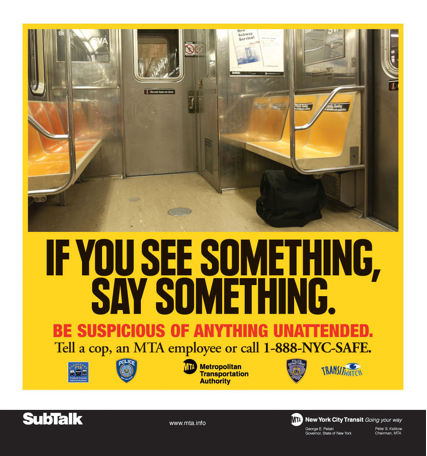For almost fifteen years, you have likely been exposed to “If you see something, say something” messaging. An ad agency developed the messaging shortly after the horrific terrorism and tragedies of September 11, 2001. While some federal agencies rejected the campaign, the NYC Transportation Authority adopted it to encourage residents and tourists to report any suspicious behavior. As reports of suspicious behavior increased and as others started using the phrase, the messaging spread.
The “If you see something, say something” message was clear, concise, and catalytic in causing people to be more alert and report suspicious behavior. After all, the stakes were and are too high not to “say something if you see something.” The safety of people is way too important to shrug off saying something, to delay addressing an issue. The same must be true in community that is Christian.
We need confrontation.
In Christian community, we live and labor alongside broken and struggling brothers and sisters. We ourselves, no matter how long we have walked with the Lord, are broken and struggling with our own issues. All of us are prone to wander and fall, so we need people around us who “if they see something, say something,” who care when something in our lives is left “unattended.” We need people around us who are loving enough to confront us when our hearts are unattended by His truth, when our marriages are unattended by our affections, when our relationships are unattended by forgiveness, and when our decisions are unattended by His agenda.
We need to confront.
If sin goes un-confronted, the community can self-destruct because the community loses the commitment to the values and beliefs that make her distinct. If you are in Christian community and you see something in a brother or sister’s life, if you see hearts unattended by His grace and truth, say something to the person. After all, what good is community if it fails to confront? But as we confront, we must confront in the following four ways:
1. Restoratively (Proverbs 27:6)
Confrontation within the confines of a trusting relationship is much more likely to be received. When we know someone loves us and wants the best for us, we are much more likely to hear and respond to the confrontation. The goal of confrontation must be restoration, not merely unleashing frustration.
2. Privately (Matthew 18:15)
No one wants to be embarrassed, and confronting privately gives the best opportunity for a restorative conversation. It is a blemish on community when people talk about people rather than to people. Just as you want people to come to you, treat others with the same love and respect you desire.
3. Quickly (Ephesians 4:27)
Quickly confronting builds trust because people learn you keep a short account and move on. Quickly confronting prevents seeds of bitterness from growing and destroying relationships.
4. Gently (Galatians 6:1)
The best confrontations result in people knowing they are loved, knowing that the best is desired for them, and knowing that the relationship can be stronger moving forward. That kind of confrontation does not happen without a gentle spirit.
Throw yourself into a community where if people see your life or heart unattended, they will say something. And by God’s grace, offer the same gift to others.






